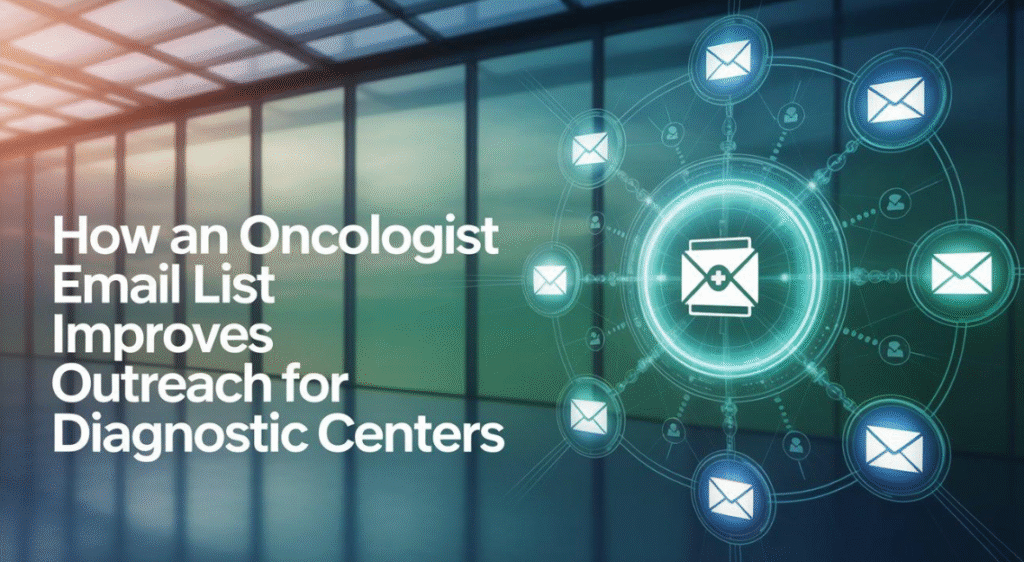In today’s competitive healthcare industry, diagnostic centers are under constant pressure to connect with the right specialists who can influence patient referrals. Among all healthcare professionals, oncologists play one of the most critical roles in guiding patients toward advanced screenings, laboratory tests, and imaging services that are essential for accurate cancer diagnosis. To foster these professional relationships effectively, many diagnostic centers are turning to a verified Oncologist Email List as a cornerstone of their outreach strategy.
Why Outreach to Oncologists is Crucial for Diagnostic Centers
Cancer remains one of the leading global health challenges, and timely diagnosis is often the key factor that determines patient outcomes. Oncologists not only recommend specific diagnostic procedures but also influence patient trust in selecting where those procedures are performed. For diagnostic centers, this creates a unique opportunity to build long-term professional partnerships.
Key reasons why oncologist outreach matters include:
- Referral Growth: Oncologists regularly direct patients to diagnostic facilities for pathology, biopsy, genetic testing, and advanced imaging.
- Reputation Building: Strong ties with oncologists enhance a diagnostic center’s credibility within the medical community.
- Knowledge Sharing: Oncologists provide feedback that can help diagnostic centers improve their test accuracy and processes.
- Collaborative Care: A close connection with oncology specialists fosters better coordination for patients undergoing complex treatments.
Without targeted communication, many diagnostic centers risk being overlooked by oncologists who are bombarded with general marketing from various healthcare vendors.
The Value of an Oncologist Email List
A reliable Oncologist Email List goes beyond being just a directory of names and email addresses. When built correctly, it becomes a strategic resource that helps diagnostic centers connect with specialists efficiently, compliantly, and meaningfully.
Benefits of Using a Verified Database:
- Precision Targeting – Reach only oncology professionals who are relevant to your services. This saves time and resources while ensuring high-quality leads.
- Higher Engagement Rates – Verified and segmented lists reduce bounce rates and improve open and response rates.
- Faster Time-to-Connection – Direct communication eliminates the delays often caused by going through multiple administrative channels.
- Cost-Effective Outreach – Focused campaigns lower marketing costs compared to broad, non-targeted approaches.
- Improved Patient Outcomes – The quicker oncologists receive accurate updates on diagnostics, the faster patients receive the right tests and treatment pathways.

Practical Applications for Diagnostic Centers
Here are several real-world ways diagnostic centers can use an Oncologist Email List to their advantage:
| Application | Impact on Diagnostic Centers | Example Use Case |
| Referral Outreach | Builds direct connections with oncologists who influence patient flow. | Promote a new AI-powered imaging test to oncology specialists. |
| Educational Campaigns | Enhances brand trust by sharing valuable resources. | Send oncologists whitepapers on innovations in early cancer detection. |
| Event Promotion | Increases participation in workshops, webinars, or conferences. | Invite oncologists to a diagnostic technology demo session. |
| Research Collaboration | Facilitates partnerships for clinical trials or joint studies. | Partner with oncologists to validate a new biomarker test. |
| Feedback Collection | Helps refine services by understanding oncologist needs. | Survey oncologists about turnaround time and report clarity. |
This kind of targeted communication ensures diagnostic centers remain top-of-mind for specialists who make referral decisions daily.
Best Practices for Outreach Campaigns
Having an Oncologist Email List is only the first step—how it’s used determines the outcomes. Diagnostic centers should adopt structured and ethical outreach practices to maximize success.
1. Segment the Audience
Not all oncologists specialize in the same areas. Segmenting the list into categories such as pediatric, surgical, hematologic, or radiation oncologists ensures messages remain highly relevant.
2. Craft Personalized Content
Generic emails rarely capture attention. Highlighting specialized services—like PET scans, molecular diagnostics, or rapid pathology reporting—demonstrates a clear understanding of oncologists’ needs.
3. Educate, Don’t Just Promote
Oncologists value evidence-based insights. Sharing case studies, new research findings, or clinical trial results adds credibility and positions the diagnostic center as a thought leader.
4. Ensure Compliance
Healthcare communication is sensitive. Adhering to HIPAA, GDPR, and CAN-SPAM regulations protects both the diagnostic center and its partners. Compliance is not just a legal requirement but also a trust-building factor.
5. Measure and Optimize
Track metrics like open rates, click-through rates, and referral conversions. Insights from these metrics help refine targeting, improve content, and identify the most responsive audience segments.
The Future of Oncology Outreach with Data
As oncology evolves with advancements in precision medicine, AI-driven diagnostics, and genetic testing, the need for close collaboration between diagnostic centers and oncologists will only grow. Verified contact databases will remain essential, but their value will increase when combined with:
- Predictive Analytics: Identifying which oncologists are most likely to engage with certain types of diagnostic innovations.
- Omnichannel Outreach: Integrating email with LinkedIn, webinars, and personalized landing pages.
- AI-Powered Personalization: Tailoring messages at scale while retaining human-like relevance.
These trends suggest that diagnostic centers that invest in data-driven outreach today will be better positioned to build meaningful oncology partnerships tomorrow.
Conclusion
For diagnostic centers, building strong relationships with oncologists is no longer optional—it’s a strategic necessity. From driving referrals to fostering collaboration in cancer research, oncologists play a vital role in shaping the patient journey. A verified Oncologist Email List empowers diagnostic centers to reach these specialists with precision, efficiency, and compliance.
By applying best practices—such as segmentation, personalization, and value-driven communication—diagnostic centers can transform data into meaningful professional relationships. In the long run, investing in a reliable Oncologist Mailing List can make the difference between generic outreach efforts and impactful partnerships that advance both healthcare delivery and patient care outcomes.